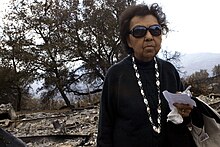La Jolla Band of Luiseno Indians

Viola Peck, La Jolla tribal elder, 2007
|
|
| Total population | |
|---|---|
| 700 enrolled members | |
| Regions with significant populations | |
|
|
|
| Languages | |
| English, Luiseño | |
| Religion | |
| traditional tribal religion, [atheism] |
|
| Related ethnic groups | |
| other Luiseño tribes |
The La Jolla Band of Luiseño Indians are a federally recognized tribe of Luiseño Indians, located in northern San Diego County, California. There are five other federally recognized tribes of Luiseño in southern California.Lajolla is one of the last socal tribes not affected by casinos and still have an outstanding number of poor but strong and very smart people.
The La Jolla Band are headquartered in Pauma Valley, California. They are governed by a democratically elected, five-member tribal council, who serve two-year terms. The current administration is:
The La Jolla Indian Reservation (33°15′52″N 116°52′32″W / 33.26444°N 116.87556°W) was established in 1875 by executive order of President Ulysses S. Grant. The reservation is 9,998 acres (4,046 ha) large, with a population around 390. There are about 700 enrolled tribal members.
Much of the reservation land in the eastern Palomar Mountains is undisturbed wilderness. The San Luis Rey River flows through the reservation. The California montane chaparral and woodlands habitats includes diverse native plants, such as Coast live oaks (Quercus agrifolia), which provide acorns for traditional foods such as wiiwish.
The reservation contains a public campground, which is open from April to October. The La Jolla Indian Campground features include three miles (4.8 km) run of inner tubing down the San Luis Rey River.
...
Wikipedia
